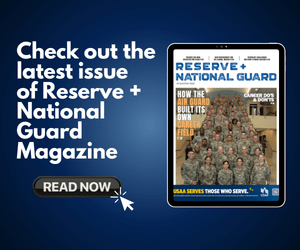Military spouses are adapting their career goals by pursuing employment that is as transient as their way of life.
While the unforeseen tends to be the norm for the military lifestyle, one constant that can be expected during a service member’s career is Permanent Change of Station (PCS) orders. With relocation comes a whole host of tools to help a family get established in a new area. What isn’t on the moving checklist is how to transition a career as a military spouse.
Entrepreneurship as a portable career option

Kaye Putnam, an Army wife stationed in Naples, Italy, quickly learned the value of finding a profession that provides flexibility from duty station to duty station. She has moved four times in just six years. She decided working for herself would be a great fit regardless of location.
“After needing to quit two jobs that I loved for PCS moves, I moved into online entrepreneurship to stabilize my career,” she said. “I had a strong desire to choose myself. Sending resume after resume every time that we moved was exhausting.”
The common portable careers for military spouses are in fields of education, healthcare, and technical careers, according to Military OneSource’s Spouse and Education Opportunities (mySECO). But, Putnam says entrepreneurship can also be versatile for professionals on the move.
“Teaching and nursing are the usual suspects (for portable careers), but I’m a huge advocate for military spouses working online as business owners, freelancers, and contractors. The work can be done from anywhere and you don’t even need a degree – you only need to show results,” Putnam, a brand strategist, said. “Skill sets and job titles that work well for online entrepreneurship are virtual assistants, designers, programmers, writers, marketing specialists, customer service, and project managers. And there are thousands of sub-categories and other opportunities beyond those.”
Researching portable careers
No matter which path a military spouse decides to pursue, there are some basic steps to take even before those household goods arrive at a new home. The first: research and network.
Retiree spouse Sue Hoppin says social media is a powerful tool to have in the employment search arsenal. The Air Force wife of nearly 25 years founded the National Military Spouse Network (NMSN) — the pre-eminent networking, mentoring and professional development organization committed to the education, empowerment and advancement of military spouses, according to the organization’s website. She wanted to build a support network that transcends geographical locations. She advises spouses to tackle the employment search as soon as orders are received.
“Start before you move. Put in the time and do the research. Look for Facebook groups and pages representing their new community,” Hoppin said. “If they own a business, figure out what they’ll have to do, to move their business. Where will they have to register? What kind of licenses will they need? Follow the breadcrumbs so that by the time they’re at their new installation, they’ll already know the organizations they should connect with and the companies that are hiring.”
Spousal employment continues to be a leading topic within the military community with unemployment rates ranging between 12 to 26 percent. Hoppin attributes that to the evolution of military families over time.
“We’re moving away from the 1950’s picture of the military family where the mom (and it was mostly moms) stayed home to raise the kids and dad brought home the bacon. We have more diverse families now. And more families that rely on two incomes,” she said. “We all know that the decision to stay in or get out is made around the kitchen table. Therefore, military spouse employment becomes a readiness issue.
Network
For spouses who want to work, it can be challenging to get established or know where to look for opportunities. It is one of the reasons Hoppin started NMSN as a resource to build those professional networks.
“By the time we get to a location and get a job, we’re halfway out the door and looking at the next duty location. We had to do better,” Hoppin said. “With social media platforms out there like LinkedIn, Facebook and Twitter, there’s no reason we can’t start networking before PCSing and maintain those networks through the moves.”
She added that networking will help a candidate stand out from the pack, especially in day and age where the online application process is so prevalent.
“When you network effectively and take the time to build real relationships, the impact on your job search and/or business is priceless.
For jobseekers, there’s a hidden job market that equates to upwards of 70-80 percent of jobs that are filled through networking,” Hoppin said. “There’s so much competition out there. … That means that there are no shortcuts. To be more effective in the job search and/or finding new clients/ customers/partners, there are no short cuts. You have to get out there and network. Spend time building those relationships.”
She also suggests attending events that align with the desired career field, such as conferences, and joining professional associations.
What makes a job portable
The main reason occupations like teaching, nursing, and customer service are labeled “portable” is because they most likely exist wherever a service member will be stationed. They are common to any location. However, availability of positions is always an uncertainty. Still, programs and services that are available to military spouses can help target a resume to align with most industries at a new duty station.
For example, military installations offer free counseling at employment assistance centers and there are dozens of nonprofit organizations who focus on employment as their niche.
The Military Spouse Employment Partnership (MSEP) is one such resource that recruits local and national employers who are specifically targeting spouses for hire.
Blue Star Families created Blue Star Networks – online networks focused on those leading portable careers in education, healthcare, tech, and entrepreneurship.
Military Spouse Corporate Career Network helps spouses create a resume, do mock interviews, and find job opportunities virtually and in-person..
In Gear Career has local chapters and networking events around the globe. The organization has recently launched a resource library with information on topics such as crafting an elevator pitch. .
The MilSpo Project caters to military-spouse business owners. They offer online education resources, book clubs, and live events.



































